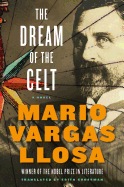
Nobel Laureate Mario Vargas Llosa abandons his familiar Latin American settings in The Dream of the Celt to tell the story of one of the most controversial and enigmatic figures in Irish and British history, Roger Casement (1864-1916). Casement is legendary, showing up in Joyce's Ulysses and as the titular subject of a William Butler Yeats poem defending the reputation of "this most gallant gentleman" after his execution for treason against Great Britain during the First World War. Vargas Llosa says Casement's story "shoots up, dies out, and is reborn after his death" like fireworks; though The Dream of the Celt is a historical novel, it's also a "novelistic" biography that closely re-creates Casement's life while shifting back and forth in time, often returning to the prison where he awaits hanging after being convicted for negotiating with Germany to support an Irish rebellion. It's a powerful tale brilliantly told.
We read about the young Irish boy's love of the explorer Sir Henry Morton Stanley--which turns to hatred when the adult Casement sees firsthand the terrible treatment Congolese natives receive at the hands of the rapacious Belgians. The scenes detailing Casement's deep friendship with Joseph Conrad are excellent, as are the sections dealing with his homosexuality, as detailed in the controversial "black diaries" which the British government seized and then circulated to undermine the movement to have his death sentence commuted. The Dream of the Celt is the fifth Vargas Llosa to be translated by Edith Grossman (who also translated many of Gabriel Garcia Marquez's books), and it's hard to imagine her peerless work is a translation, so smoothly does it read. --Tom Lavoie, former publisher

